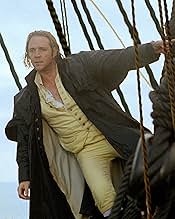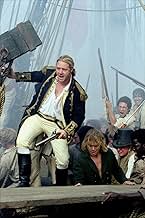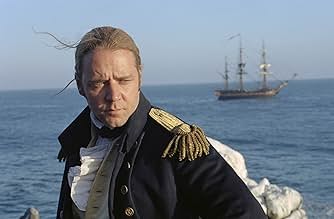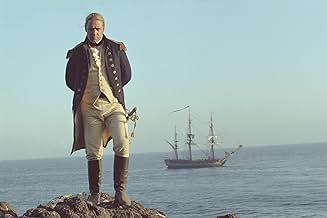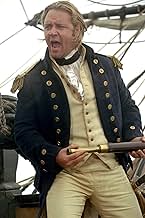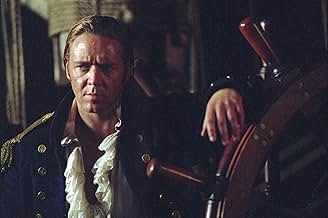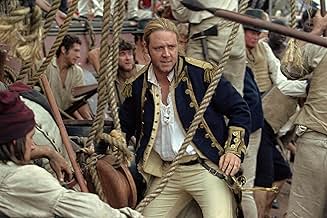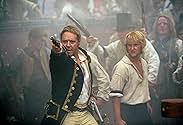Master and Commander : De l'autre côté du monde
Titre original : Master and Commander: The Far Side of the World
Pendant les guerres napoléoniennes, un capitaine britannique impétueux pousse son bateau et son équipage à bout à la poursuite d'un formidable navire de guerre français en Amérique du Sud.Pendant les guerres napoléoniennes, un capitaine britannique impétueux pousse son bateau et son équipage à bout à la poursuite d'un formidable navire de guerre français en Amérique du Sud.Pendant les guerres napoléoniennes, un capitaine britannique impétueux pousse son bateau et son équipage à bout à la poursuite d'un formidable navire de guerre français en Amérique du Sud.
- Récompensé par 2 Oscars
- 23 victoires et 90 nominations au total
Histoire
Le saviez-vous
- AnecdotesRussell Crowe learned to play violin for the film and referred to it as the hardest thing he'd ever done for a film.
- GaffesDuring the Storm when the Surprise is chasing the Acheron around Cape Horn, Barrett Bonden is shown alone at the wheel. It was customary on a Royal Navy vessel of the time to always have at least two men at the wheel both as a security measure in case one man was injured in battle, and because the rudder itself was extremely heavy and difficult to turn. During any sort of heavy weather there would certainly have been four or more men at the wheel as one man would not be able to control the rudder (which is why the ship has two connected wheels).
- Citations
[Toasting]
Capt. Jack Aubrey: To wives and sweethearts.
Officers: To wives and sweethearts.
Capt. Jack Aubrey: May they never meet.
- Crédits fousThere are no opening credits.
- ConnexionsEdited into Spisok korabley (2008)
- Bandes originalesGhost of Time
Composed by Iva Davies, Christopher Gordon and Richard Tognetti
Performed by Iva Davies and Icehouse
Featured Violin Performance by Richard Tognetti
Orchestrated by Christopher Gordon
Commentaire à la une
"Master and Commander: The Far Side of the World" is half swashbuckling action movie, half detailed examination of life in the 19th-century British navy, and all entertaining. Director Peter Weir has created an intriguing film that nicely balances fierce battle sequences with quiet, intimate scenes.
Nearly all of the film takes place aboard the HMS Surprise, under the command of Captain "Lucky" Jack Aubrey (Russell Crowe). The captain's orders: to intercept and disable the French privateer Acheron, which is troubling British vessels off the coast of South America. The two ships clash early on, and the Surprise is thoroughly routed--the Acheron is larger, faster, and more modern. But Aubrey, with a determination that might not entirely be due to his sense of duty, is not one to give up, and the Surprise chases the Acheron--and/or vice versa--down the Brazilian coast, around Cape Horn, and to the Gallapagos Islands.
That's the action part. The intimate part involves Aubrey's relationship with the ship's surgeon, Stephan Marutin (Paul Bettany). Stephan is a quiet intellectual and devout naturallist, whose train of thought is foraying into the territory that would make Darwin a household name later in the century. He's also the only one among the crew who's either willing or able to call Aubrey's decisions into question. He provides a grounding force for the captain, and the friendship between these two dissimilar men is the emotional heart of the story.
I've yet to read any of the Patrick O'Brian series upon which "Master and Commander" is based, but the movie shows every evidence of being derived from a painstakingly and meticulously detailed work, one which has gone to great lengths to re-create the world and environment of these men. The details on screen are wonderful, depicting the sort of harsh conditions that make the contestants on those "reality" series look like the overglorified wimps they are. The crew of the Surprise (many of them not older than twenty) lives in claustrophobic and none-too-clean quarters--at times it seems as if every inch of the screen is crammed full--and sleep in hammocks that may very well end up serving as their shrouds. Battles are chaotic, with cannon fire ripping huge holes in the ship and sending shrapnel in every direction. The weather seems to exist only in extremes: still heat, raging tempests, even snow as they drift down near the Antarctic circle. Good service is rewarded with extra rations of grog and brandy, insubordination is punished by the whip. It's a place where both close friendships and deep resentments can grow, and the tension in the air at times feels like a living presence.
Crowe dominates the production, once again proving himself one of the best leading men working in movies. In his hands, Jack Aubrey is a natural leader of men: clever, courageous, determined, and capable of what nowadays is called "thinking outside the box." He is frequently confronted with difficult choices, but takes his responsibilities and the consequences of his actions unflinchingly. Bettany turns in an equally good performance as Aubrey's emotional and ideological opposite; the two men play wonderfully off of each other. Most of the rest of the crew tends to blur together (the exceptions include a young officer who's right arm gets amputated early on, and later takes command of the ship), but "Lord of the Rings" fans will be amused to notice Billy Boyd among the ranks.
The combination of action and introspection in "Master and Commander" at times seems like an odd mix, but the film succeeds on both levels. Definitely a voyage worth taking.
Nearly all of the film takes place aboard the HMS Surprise, under the command of Captain "Lucky" Jack Aubrey (Russell Crowe). The captain's orders: to intercept and disable the French privateer Acheron, which is troubling British vessels off the coast of South America. The two ships clash early on, and the Surprise is thoroughly routed--the Acheron is larger, faster, and more modern. But Aubrey, with a determination that might not entirely be due to his sense of duty, is not one to give up, and the Surprise chases the Acheron--and/or vice versa--down the Brazilian coast, around Cape Horn, and to the Gallapagos Islands.
That's the action part. The intimate part involves Aubrey's relationship with the ship's surgeon, Stephan Marutin (Paul Bettany). Stephan is a quiet intellectual and devout naturallist, whose train of thought is foraying into the territory that would make Darwin a household name later in the century. He's also the only one among the crew who's either willing or able to call Aubrey's decisions into question. He provides a grounding force for the captain, and the friendship between these two dissimilar men is the emotional heart of the story.
I've yet to read any of the Patrick O'Brian series upon which "Master and Commander" is based, but the movie shows every evidence of being derived from a painstakingly and meticulously detailed work, one which has gone to great lengths to re-create the world and environment of these men. The details on screen are wonderful, depicting the sort of harsh conditions that make the contestants on those "reality" series look like the overglorified wimps they are. The crew of the Surprise (many of them not older than twenty) lives in claustrophobic and none-too-clean quarters--at times it seems as if every inch of the screen is crammed full--and sleep in hammocks that may very well end up serving as their shrouds. Battles are chaotic, with cannon fire ripping huge holes in the ship and sending shrapnel in every direction. The weather seems to exist only in extremes: still heat, raging tempests, even snow as they drift down near the Antarctic circle. Good service is rewarded with extra rations of grog and brandy, insubordination is punished by the whip. It's a place where both close friendships and deep resentments can grow, and the tension in the air at times feels like a living presence.
Crowe dominates the production, once again proving himself one of the best leading men working in movies. In his hands, Jack Aubrey is a natural leader of men: clever, courageous, determined, and capable of what nowadays is called "thinking outside the box." He is frequently confronted with difficult choices, but takes his responsibilities and the consequences of his actions unflinchingly. Bettany turns in an equally good performance as Aubrey's emotional and ideological opposite; the two men play wonderfully off of each other. Most of the rest of the crew tends to blur together (the exceptions include a young officer who's right arm gets amputated early on, and later takes command of the ship), but "Lord of the Rings" fans will be amused to notice Billy Boyd among the ranks.
The combination of action and introspection in "Master and Commander" at times seems like an odd mix, but the film succeeds on both levels. Definitely a voyage worth taking.
Meilleurs choix
Connectez-vous pour évaluer et suivre la liste de favoris afin de recevoir des recommandations personnalisées
- How long is Master and Commander: The Far Side of the World?Alimenté par Alexa
Détails
- Date de sortie
- Pays d’origine
- Sites officiels
- Langues
- Aussi connu sous le nom de
- Capitán de mar y guerra: La costa más lejana del mundo
- Lieux de tournage
- Sociétés de production
- Voir plus de crédits d'entreprise sur IMDbPro
Box-office
- Budget
- 150 000 000 $US (estimé)
- Montant brut aux États-Unis et au Canada
- 93 927 920 $US
- Week-end de sortie aux États-Unis et au Canada
- 25 105 990 $US
- 16 nov. 2003
- Montant brut mondial
- 211 622 535 $US
- Durée2 heures 18 minutes
- Couleur
- Mixage
- Rapport de forme
- 2.39 : 1
Contribuer à cette page
Suggérer une modification ou ajouter du contenu manquant

Lacune principale
What was the official certification given to Master and Commander : De l'autre côté du monde (2003) in India?
Répondre






